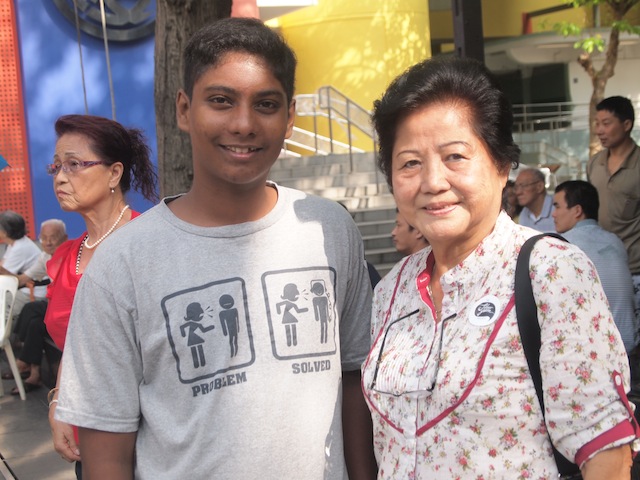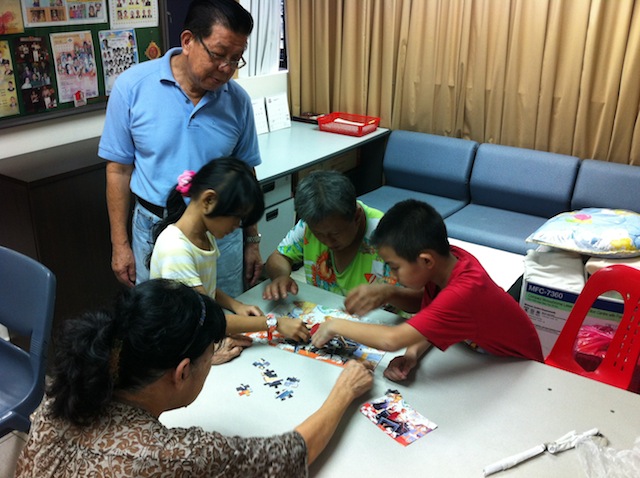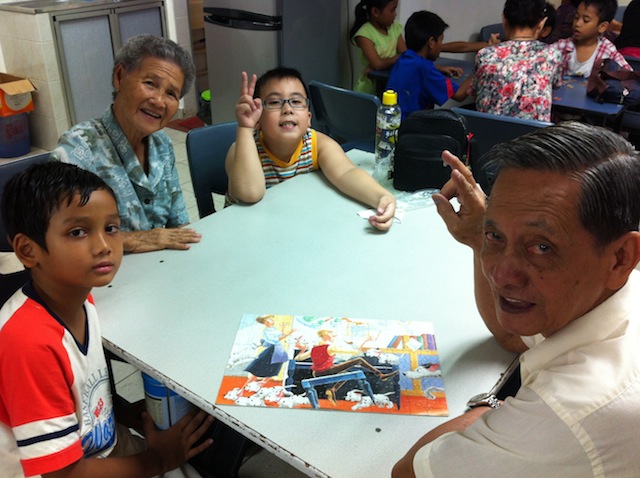Foster grandparent
The Grandparent Fostering Programme, a community programme launched in Jalan Kukoh precinct in November 2012, bonds the young and old together, and bridges the generation gap.
BY: Eleanor Yap
Generation gap and language barrier are some of the challenges facing the young and old while they interact with one another. However, these are not an issue when it comes to 77-year-old Wan Po Wan and 15-year-old Shanger S/O Punnerchalvam. Both form a foster grandparent-child pair under the Kreta Ayer-Kim Seng’s Grandparent Fostering Programme (GFP), an initiative that pairs seniors living without or apart from their children with youths living in the Jalan Kukoh precinct.
Po Wan understands only a little English and Shanger can converse in both English and a little Chinese. The language barrier did not stop them from building a bond that has allowed them to not only meet at the weekly activity session at Jalan Kukoh Residents’ Committee Centre where they play games and exercise together but they also meet regularly on their own. Shanger often helps Po Wan with her grocery shopping since they only live a block apart. During his school holidays, he makes an effort to go down to the Jalan Kukoh Seniors’ Activity Centre (SAC) almost every day to help out and spend time with Po Wan and other seniors.
Shanger shared: “Initially I thought it would be boring because I don’t relate well to the elderly. I didn’t have a great relationship with my grandparents and I always thought that they were tiresome and nagged a lot. The programme has helped me to appreciate the elderly and my own grandparents more.”
For Po Wan, she likes Shanger a lot and treats him like her own grandson. She said: “I don’t have any children or grandchildren of my own, so I really enjoy spending time with him. His companionship makes me feel happy and youthful.”
Ageless Online speaks to Kang Han Poh, vice-chairman of Jalan Kukoh Residents’ Committee and main coordinator for the GFP to find out more about the programme and what’s in store:
When did GFP get started and what are its purposes?
The Grandparent Fostering Programme was launched in November 2012. It was first conceptualised by Dr Lily Neo, our grassroots adviser and MP for Tanjong Pagar GRC. During her visit to the Jalan Kukoh SAC in April 2012, she expressed her concern about the lonely elderly, who are also SAC members, staying alone at home during the weekends. She then suggested that it would be a great idea to bring both the children in our RC tuition classes and the elderly in our SAC together for bonding and sharing.
Yes, the youth today may have lost contact of interacting with their grandparents. The problem may lie with the fact that they don’t live together and the social contact may have diluted. Hence, more youths or young children may have forgotten the way to interact with their grandparents.
Do you feel filial piety is slowly eroding away?
In my personal opinion, I feel that the youth today may not fully appreciate and understand their grandparents enough. I would say that communication between grandparents and their grandchildren are weak. There is still a sense of filial piety but it is not what we see or hope for as compared to the past.
To date, how many pairs have your RC matched through this programme? Are all of them residents of Jalan Kukoh? How did you pair them up and what are the criteria?
To date, the RC has matched 13 pairs of grandparent and youth. A total of 12 elderly are residing in Jalan Kukoh estate and one elderly resides at Chin Swee Road, which is just one street away. All the children and teenagers in our programme live within the Jalan Kukoh precinct. We have engaged them at our weekly activity session that is organised by the RC and SAC. The only criterion is that one of the participants between the pair must be a resident of the Jalan Kukoh estate. I am glad to share that in fact the participants have voluntarily registered in the GFP and I have also personally contacted the youths’ parents to seek for their consent. The parents were all very supportive and they were enthusiastic to have their children participate in this programme.
I understand that most of the pairs are interracial. Why is this important?
Our RC has always been actively promoting racial harmony and social cohesion within the Jalan Kukoh estate. As we have more non-Chinese children and teenagers in our programme, thus, it just came naturally that they volunteered themselves to join the GFP. We are glad to see that this programme has generated lots of interest among our members and we are positive that it is moving towards the right direction.
In their weekly activity sessions, what do they usually do? And do they also meet outside the RC?
They usually meet every Sunday for the weekly activity session and it usually lasts about two to three hours. During the session, they will do some sharing, play some games and do some simple exercises together. As time goes by, we see that they are meeting more often on other days on their own. An example of such cases is Shanger who helps Madam Wan to buy groceries or bread if needed. The youths are also encouraged to visit the elderly at the SAC.
What have been some of the challenges in this programme?
In the first few sessions, language barrier had been the biggest challenge for the participants as well as for us. They couldn’t communicate with one another. We had to talk to them separately and try to figure out ways to resolve this issue. As time went by, the children and teenagers were able to slowly interact with the elderly through simple hand movements as well as body language. Simple games such as jigsaw puzzles and five stones, which don’t need much communication, really helped to bring them together.
Can you share two successful pairs and what the pairs have learned as a result?
Ahmad Syairazi Bin Sahlan (14 years old), who is paired with Chau Juat Ngo (60 years old), has learned to take care of the elderly. His grandparent is not living with him. During GFP, he serves food to Madam Chau who he treats as his “foster grandparent”. Madam Chau is a divorcee and her own children have not visited her for years. She is one of the elderly who volunteered to join the programme and has expressed that she is happy to mix around with the youths. The companionship has made her contented and willing to continue attending the programme.
Another pair who can’t communicate through a common language is Madam Tan and Saddam. Madam Tan is a grandmother who lives at Chin Swee Road. Though she does have grandchildren, they do not visit her often. The companionship in the programme helps Madam Tan and Saddam build a better bond in playing games. During a competition that we organised previously, they won the first prize. We are seeing both Saddam and Madam Tan building a close bond between themselves.
In both pairs, companionship is the main reason that makes the elderly contented. Through the programme, our RC hopes to inculcate filial piety to the youths and cultivate care and concern to the grandparents through various activities.
Will you increase the number of seniors and youths in the current programme?
Yes, our RC does have plans to invite more elderly and youth to participate in this meaning community programme.
Will this programme be expanded beyond the RC?
Yes, Dr Neo would like to expand it to all residents living within Kreta Ayer – Kim Seng constituency. Therefore, our target audience is the entire seniors who reside in our estate. We are continuously promoting this programme to all our young and old residents.
Do the RC have other intergenerational bonding initiatives?
Our RC block parties do engage all our residents. We do make a point to inject intergenerational bonding elements into our community events and activities. We believe that we could do more to reach out to our residents and to make Jalan Kukoh neighbourhood estate a better place for everyone.




0 Comments